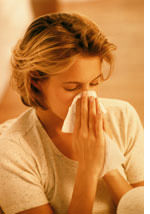By Jake Paul Fratkin, OMD, L.Ac.
Coughs are one of the main reasons patients visit doctors, both Western and alternative. Many people ignore their cough until it becomes apparent that it’s not going away on its own. Besides treatment for daytime cough, patients also seek relief from night-time coughing, painful chest sensations, sore throat while coughing, fatigue and headache.
Western medicine offers very few choices for dealing with cough, primarily antibiotics, antitussives (cough suppressants) and expectorants such as guaifenesin (found in products such as Robitussin®, Anti-Tuss® and Scot-Tussin®).
As recently reported by The American College of Chest Physicians (ACCP), over-the-counter (OTC) cough expectorants and suppressants don’t treat the underlying causes of the cough, and often don’t help relieve symptoms. Antibiotics are also of limited value, since 95% of all coughs are viral in nature. Antibiotics may be helpful for reducing phlegm, but they can weaken the immune system and allow a recurrent infection.
Cough and the Common Cold
 Chinese doctors view coughs as the result of the common cold, presenting with symptoms that can include sore throat, nasal discharge, aches and, in a few cases, fever. For this reason one should make every effort to treat a common cold at its earliest stages, when the infection is still isolated to the nose or throat. In my view the best way to do this is with a Chinese antiviral herbal formula. Once a cold has migrated into the lungs, treating the resulting infection will be much harder and take more time to resolve. Even with herbs, cough can take from 3 to 12 days to completely clear.
Chinese doctors view coughs as the result of the common cold, presenting with symptoms that can include sore throat, nasal discharge, aches and, in a few cases, fever. For this reason one should make every effort to treat a common cold at its earliest stages, when the infection is still isolated to the nose or throat. In my view the best way to do this is with a Chinese antiviral herbal formula. Once a cold has migrated into the lungs, treating the resulting infection will be much harder and take more time to resolve. Even with herbs, cough can take from 3 to 12 days to completely clear.
In Chinese medicine, as the cold virus migrates to the lungs it quickly triggers an inflammatory reaction. The first sign of lung infection is a dry cough that can become quite severe, resulting in a painful, barking cough. This hot, inflammatory stage quickly leads to congestion as the lungs react by producing phlegm, in part to try to protect the lung tissues. Phlegm itself, however, blocks the air passages, reducing oxygen exchange and contributing to increased fatigue. The cough is one mechanism the body employs in an attempt to loosen and expectorate the phlegm. Unfortunately, if inflammation and infection are not treated – and resolved soon – the production of phlegm, and resulting cough, can go on for days, or even weeks.
Chinese Herbs for Cough
Classical Chinese cough formulas date back to 15th and 16th centuries. These formulas are used by literally millions of people in China and continue to be popular today. Why? Because they are so effective.
These formulas are especially effective in that they combine a variety of herbs traditionally used in different formulas for a variety of applications. Chinese medicine has many anti-viral herbs – one of its greatest gifts – and the inclusion of these herbs enables advanced lung to address the root causes of cough.
I recommend looking for a formula that contains herbs that reduce inflammation (heat) and fight viral infection such as Belamcanda (She Gan), Andrographis (Chuan Xin Lian), Scutellaria (Huang Qin) and Gardenia (Zhi Zi).
Secondly, choose a formula that includes a selection of herbs shown to reduce chest congestion by breaking down phlegm and aiding in its removal from the lungs, such as Trichosanthes (Gua Lou Ren), Fritillaria (Bei Mu) and Platycodon (Jie Geng).
Finally, look for a formul that provides herbs that symptomatically halt coughing, such as Stemona (Bai Bu) and Armenica (Xing Ren).
Summary
Coughs can be stubborn and the sooner they are treated, the sooner they will resolve. While in some cases this can take anywhere from three to twelve days, with quick treatment coughs will gradually lessen in both duration and severity.
About the Author
Jake Paul Fratkin, Doctor of Oriental Medicine, is a leading practitioner of Chinese herbal medicine, Japanese meridian balancing and nutritional medicine. Currently in private practice in Boulder, Colorado, Dr. Fratkin specializes in internal disorders, infections and pediatrics. In 1999 Dr. Fratkin was named Acupuncturist of the Year by the American Association of Oriental Medicine (AAOM). Dr. Fratkin currently serves on the faculty of Acupuncture and Integrative Medicine College, Berkeley. In addition to authoring Chinese Herbal Patent Medicines: The Clinical Desk Reference, (2001), Dr. Fratkin also edited Wu and Fischer’s Practical Therapeutics of Traditional Chinese Medicine (Paradigm Publications, 1997).











